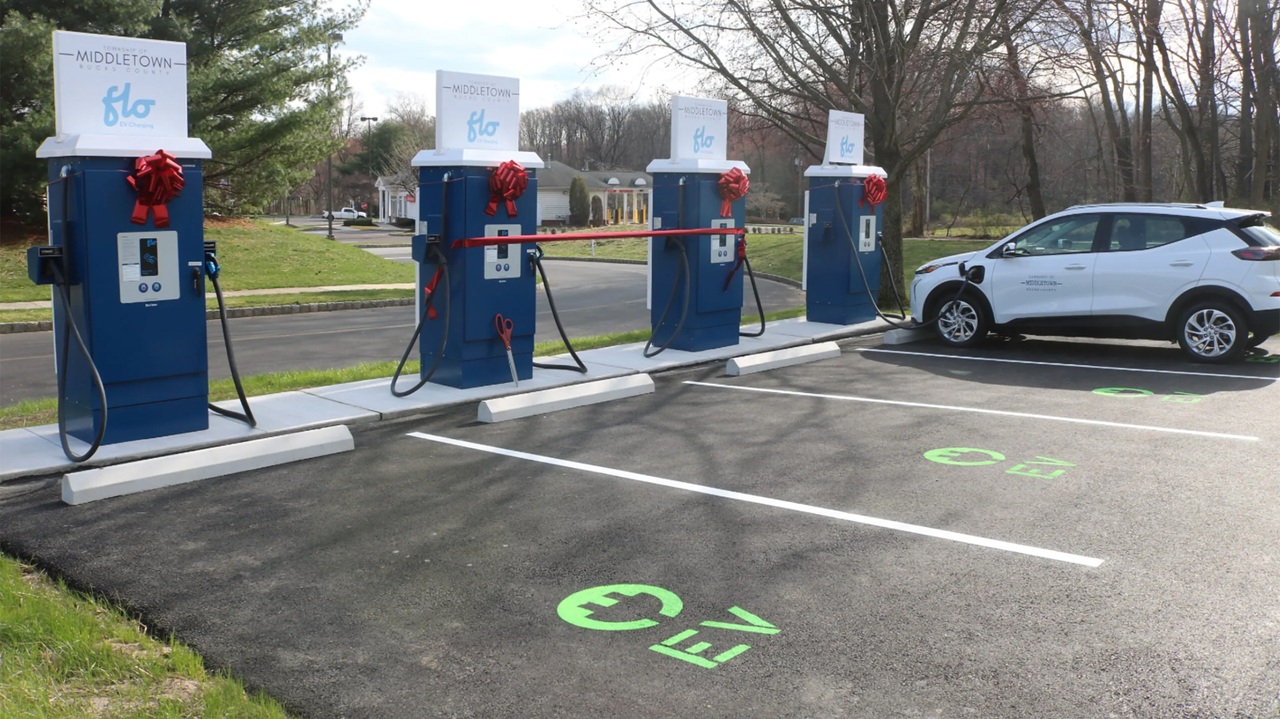
“We should do this.” This was the message the former chairperson of our governing body sent to our township manager in mid-2020, along with an email thread seeking communities in Pennsylvania to join the Local Climate Action Program.
A year later, our governing body joined a then-small group of municipalities in Pennsylvania to adopt a municipal climate action plan (middletownbucks.org/cap). The plan assessed local greenhouse gas emission data, outlining a series of short, medium, and long-term goals to reduce emissions over the coming decades and enhance municipal operational sustainability.
Until that point, our sustainability efforts, like those of many municipalities, had consisted of a handful of one-off projects without a clear vision.
In the 3.5 years since the climate action plan was adopted, Middletown Township has celebrated several implementation milestones, chief among them being the installation of Pennsylvania’s first four publicly owned DC-fast (Level 3) electric vehicle (EV) charging stations at our municipal building. In the same time frame, our municipality has received Excellence in Local Government awards from Governor Tom Wolf in 2022 for our climate action plan and from Governor Josh Shapiro in 2024 for our EV charging station installation.
The implementation of comprehensive sustainability plans and new initiatives is rapidly becoming commonplace in local government, particularly for those in an assistant chief administrative officer (ACAO) role. ACAOs are uniquely positioned—and increasingly called upon—to serve as the chief implementation officers who transform climate policy aspirations into concrete, impactful change.
The Role of the Chief Implementation Officer
ACAOs often find ourselves at the nexus of translating the governing body’s policies or the CAO’s vision into implementing actionable, meaningful change. Particularly in organizations without dedicated staff for sustainability initiatives, ACAOs quickly assume the mantle of CIO—chief implementation officer.
Unlike other service areas, most public administrators lack formal training in environmental science. The learning curve can feel steep. It is made even more daunting when your community—or even a faction of your governing body—is actively opposed to your work.
Take the time to understand the jargon underpinning the projects or policies that your community is pursuing. When in doubt, reach out to colleagues who have done something similar. Chances are, if they cannot provide the answer directly, they can connect you with someone who can.
No Idea Is Too Big
Weeks after our governing body enacted the climate action plan, I attended the 2021 ICMA Annual Conference in Portland, Oregon. On an elevator ride at the hotel, I crossed paths with Peggy Flynn, city manager of Petaluma, California. We each shared stories of recent successes in our communities—my community’s adoption of a climate action plan and her community’s passage of the nation’s first ban on new gas stations.
You’re doing what? Banning gas stations? This seemed unfathomable. Many states would not permit a municipality to pursue such a policy. However, it became clear that the array of sustainable initiatives that communities can pursue is vast.
The reaction I had to Peggy in 2021 is the same reaction I receive from some colleagues about our Level 3 EV charging installation. The proximity of our site to major transportation corridors, a shopping center, and diverse residential neighborhoods, as well as grant funding, made our project work for us. While a policy or initiative suitable for one community may not fit another, seize the opportunity to explore how you can adapt successful approaches from other communities to your own context.
Focusing on Facts Amid Controversy
Many of us are drawn to local government because the challenges we address in our communities often diverge significantly from the controversial political subjects found at national or even state levels, allowing us to focus on local issues like infrastructure, public safety, and development.
Local governments across the United States have increasingly turned their attention to addressing climate change within their communities, which creates another avenue for national politics to enter municipal council chambers.
A key strategy to minimize criticism is to focus on the facts and data relevant to your community. For example, many communities have experienced more frequent and more severe storms in recent years. What does this look like? There have been 19 recorded tornadoes in our county since 1950; 12 have occurred since 2019. “Hundred-year storms” are now impacting our community every 12 to 18 months.
The question of “Why is this happening?” can be deferred. A more approachable angle to the broader topic of sustainability focuses on the questions of “Is our community prepared for this reality?” and “Is our infrastructure capable of handling this change in demand?”
Sustainability Is not Bound to Climate Change
If your elected body or your community is hesitant to address the topic of climate change, consider reframing and expanding the conversation to sustainability —in every sense of the word. Sustainability in local government can look like:
• Developing a long-term taxation strategy that grows slower than the rate of inflation.
• Crafting an infrastructure maintenance plan that replaces 100% of an asset type by the end of its useful life.
• Evaluating neighborhoods’ proximity to parks and open spaces and identifying underserved areas.
• Identifying opportunities for succession planning in all layers of your organization.
Most people can rally behind the idea of a sustainable local government, especially when focusing on low-hanging fruit that anyone would expect or want from their municipality. The best part? We as public administrators are already hard-wired to foster sustainable operations within our municipalities—the key difference lies in how we frame and communicate our work.
The path to sustainable local government—whether tackling climate change directly or fostering an all-encompassing sustainable operation—is multifaceted and often challenging. Yet, as ACAOs, we are uniquely positioned to serve as the indispensable chief implementation officers. Our ability to translate vision into tangible progress, foster collaboration, and push the bounds of possibility drives our communities toward a more resilient, equitable, and prosperous future for generations to come.

NICK VALLA is the assistant township manager of Middletown Township, located in Bucks County, Pennsylvania, USA.
New, Reduced Membership Dues
A new, reduced dues rate is available for CAOs/ACAOs, along with additional discounts for those in smaller communities, has been implemented. Learn more and be sure to join or renew today!
